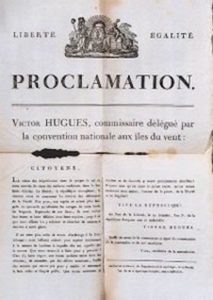
*Slavery in the British and French West Indies is remembered on this date in 1600 with a brief article. This refers to its practice in the parts of the Caribbean dominated by France or the British Empire.
The effects of the Middle Passage in the Caribbean, England colonized the islands of St. Kitts and Barbados in 1623 and 1627 respectively, and later, Jamaica in 1655. These and other Caribbean colonies later became the center of wealth and the focus of the slave trade for the growing British Empire. The Lesser Antilles islands of Barbados, St. Kitts, Saint Vincent, and the Grenadines, Antigua, Martinique, Guadeloupe, Saint Lucia, and Dominica were the first important slave societies of the Caribbean, switching to slavery by the end of the 17th century as their economies converted from tobacco to sugar production.
By the middle of the 18th century, British Jamaica and French Saint-Dominique (now Haiti) had become the largest slave societies of the region, rivaling Brazil as a destination for enslaved Africans. The death rates for Black slaves in these islands were higher than birth rates. The decrease averaged about 3 percent per year in Jamaica and 4 percent a year in the smaller islands. The diary of slave owner Thomas Thistlewood of Jamaica details violence against slaves and constitutes important historical documentation of the conditions for Caribbean slaves. For centuries slavery made sugarcane production economical. The low level of technology made production difficult and labor-intensive. At the same time, the demand for sugar was rising, particularly in Great Britain. The French colony of Saint-Domingue quickly began to out-produce all of the British islands combined.
Though sugar was driven by slavery, rising costs for the British made it easier for the British abolitionists to be heard. Slavery was first abolished by the French Republic in 1794, but Napoleon revoked that decree in 1802. In 1815, the Republic abolished the slave trade, but the decree did not come into effect until 1826. France re-abolished slavery in her colonies in 1848 with a general and unconditional emancipation. William Wilberforce's Slave Trade Act 1807 abolished the slave trade in the British Empire. In 1811 on Tortola in the British Virgin Islands, Arthur William Hodge, a wealthy plantation owner and Council member, became the first person to be hanged for the murder of a slave.
It was not until the Slavery Abolition Act 1833 that the institution finally was abolished, but on a gradual basis. Since slave owners in the various colonies (not only the Caribbean) were losing their unpaid laborer’s, the government set aside £20 million for compensation but it did not offer the former slaves’ reparations. The colony of Trinidad was left with a shortage of labor. This shortage became worse after the abolition of slavery in 1833. To deal with this problem, Trinidad imported indentured servants from the 1810s until 1917. Initially Chinese, free West Africans, and Portuguese from the island of Madeira were imported, but they were soon supplanted by Indians who started arriving from 1845. Indentured Indians would prove to be an adequate alternative for the plantations that formerly relied upon slave labor.
In addition, numerous former slaves migrated from the Lesser Antilles to Trinidad to work. Britain announced in 1833 that the gradual abolition would end by 1840; by then, and slaves in its territories would be totally freed. In the meantime, the government told slaves they had to remain on their plantations and would have the status of "apprentices" for the next six years. On 1 August 1834 in Trinidad, an unarmed group of mainly elderly Negroes being addressed by the Governor at Government House about the new apprenticeship laws, began chanting: "Pas de six ans. Point de six ans" ("Not six years. No six years"), drowning out the voice of the Governor. Peaceful protests continued until a resolution to abolish apprenticeship was passed and de facto freedom was achieved. This made Trinidad the first British colony with slaves to completely abolish slavery.
The successful resistance of the implementation of the full six-year term of the Apprenticeship system and Abolition of Slavery in Trinidad was marked by ex-slaves and free colored’s joining in celebrations thru the streets in what became known as their annual Canboulay celebrations. This event in Trinidad influenced full emancipation in the other British colonies which was legally granted two years ahead of schedule on August 1, 1838. After Great Britain abolished slavery, it began to pressure other nations to do the same. France finally abolished slavery in 1848. By then Saint-Domingue had already won its independence and formed the independent Republic of Haiti. French-controlled islands were then limited to a few smaller islands in the Lesser Antilles.